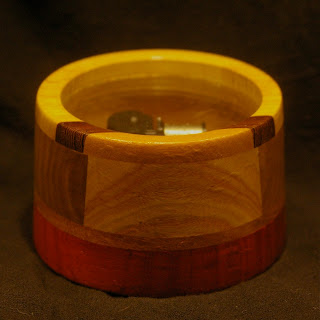Leo Brooks is a percussionist living in Aylmer, Quebec, just outside Ottawa. He has been building and repairing numerous types of drums and xylophones for about 10 years under the banner of his company “Treefrog Percussion”. This year, he added music boxes to the list of instruments he creates, and this is my interview with him.
Why did you choose to integrate Music Boxes into your work?
Well to answer that, you have to know my drums a little. One of the styles of drum that I build, called a Djembe, is made by cutting various sizes of rings out of wooden planks, and then gluing them all together. The inside cuts of the rings are then cut down again into smaller rings which can be used for smaller drums. As far as I know, I am the only person that makes djembes this way.
Some of the planks I use are made by laminating thin strips of wood to create what is essentially a striped plank. I use both domestic and exotic woods, so the resulting stripes vary in hue. There are many shades of brown, naturally, but the exotic woods add colours like red, yellow, black and even purple – all natural colours. Once these planks are planed down to the correct thickness, I cut my rings out of them. The result is that these round pieces show cross sections of the many species of wood used in the plank. Once the whole drum is assembled, it appears as a mosaic of dozens of different woods.
The problem with the process is that there is always a circle of wood left over from the inside of the rings. Because the wood is so beautiful, I have never been able to let myself just throw it away, so I have been keeping it in Rubbermaid bins since 2000, just knowing that I would find something to do with it someday. But the bins were starting to take up a lot of space.
For reasons I don’t recall, the idea to make music boxes with this wood struck me in the fall of 2009. My first boxes were done in early 2010. I have always been fascinated by music box movements, so I think it is a really good pairing with my other work.
O.K. – That explains the raw materials, but how are the boxes made?
What is the most difficult step in the process?
No process is particularly difficult, but I find the woodturning to be both rewarding and nerve-racking. Most of the time the turning process is uneventful, but occasionally the cutting chisel will grab the box and throw it off the clutch. The box can quite literally explode if it hits something turning that fast. Luckily, I have never had the glass break when this happens, but I have wrecked a few boxes this way. It’s hard to have put a lot of time into a box only to see it go into the firewood pile (the movements are removed first, obviously).
Do you have a favorite music box that you have made?I knew my first half-dozen prototypes would be for my family, and while they are all slightly flawed, they are meaningful and appreciated. My favorite box was the first one I made, which I gave to my Wife. It plays “The Anniversary Song” – a tune I had never heard until I put it into her box. I made one for each of my three kids and my nieces as well.
Where can we buy your beautiful boxes?
As of yet, I have not created any forum to sell these boxes, mostly because I have quite a few on order from people who have seen the prototypes. I make the boxes in two sizes based on the diameter of the hole for the glass on the top of the box – either 3” or 4”. I have decided for the time being to sell the 3” boxes for $60 and the 4” boxes for $75. People can simply mail me at Leo@treefrogpercussion to place an order or for more details.









.jpg)



No comments:
Post a Comment